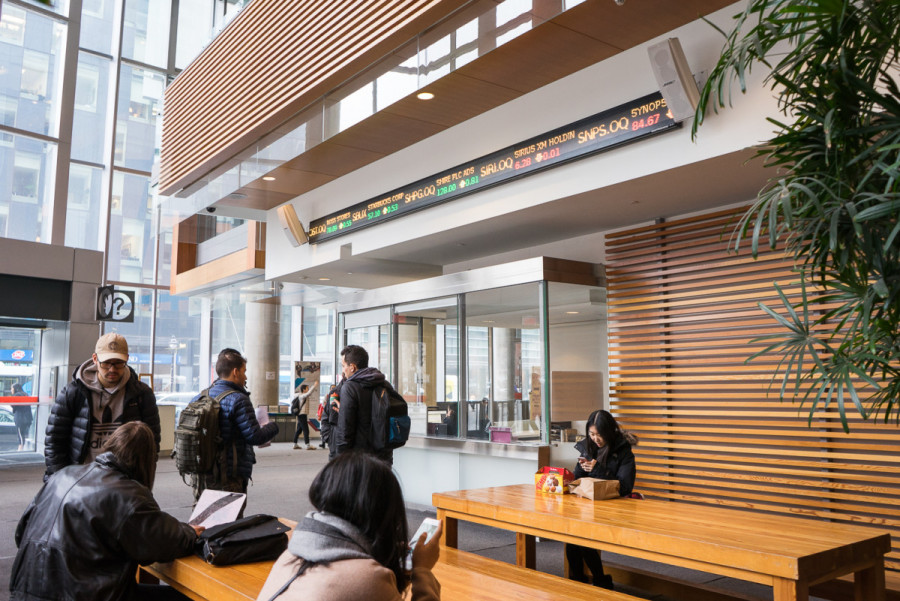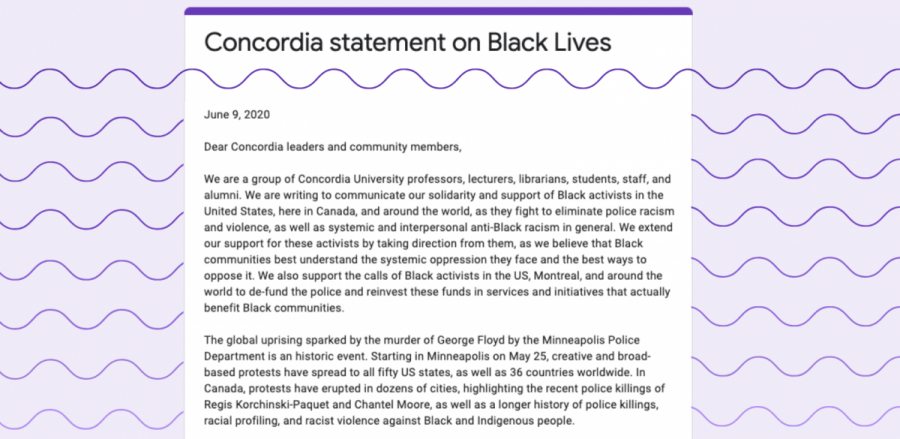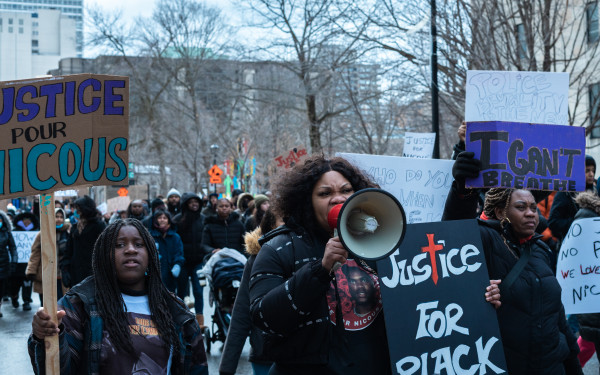Faculty Among Thousands Calling for Action on Anti-Black Racism at Concordia
Change Is Long Overdue at the University, Say Petition Co-Authors
Concordia must take responsibility for addressing systemic anti-Black racism at the university, according to a lengthy petition outlining seven concrete demands.
The statement, addressed to senior administrators, originates from a coalition of around 15 unnamed collaborators from within the Concordia community, including Black and non-Black faculty, students, and staff.
It has circulated widely on social media since it was launched last week and has been signed by nearly 7,000 Concordians.
“I’m overwhelmed by the support,” said Jamilah Dei-Sharpe, a PhD student in sociology who collaborated on the document. “It’s very emotionally exciting and draining at the same time.”
The statement comes on the heels of an explosion of global outrage sparked by the gruesome murder of George Floyd by Minneapolis police. Locally, major demonstrations against anti-Black policing and police violence have shined a light on a host of systemic injustices faced routinely by Black communities in Montreal and elsewhere.
“It was important to write a statement because in the context of Concordia specifically, Black students and Black faculty have been making demands on the university to address anti-Black racism for decades,” said Nathalie Batraville, an assistant professor at Concordia’s Simone de Beauvoir Institute and collaborator on the statement.
Dei-Sharpe hopes the current moment might finally yield long-needed reforms for Black students and others affected by institutional racism at Concordia. “Sometimes it takes a crisis,” she said.
Demands for a Black studies program, for instance, go back at least 50 years, when Black students and their allies occupied the computer centre on the ninth floor of the Hall building for nearly two weeks in 1969. The protesters were fighting against anti-Black racism at Sir George Williams University, one of Concordia’s founding institutions.
This incident resulted in nearly 100 arrests and the death of Coralee Hutchison, one of the protesters, after police stormed the computer centre upon being called in by the university.
The petition’s first demand is that Concordia minimize the involvement of police on campus.
“We can’t have a university that purports to want to have Black students and Black faculty in its midst,” said Batraville, “but then turns a blind eye to the fact that police officers are harassing, surveilling, and, unfortunately, in some cases killing Black people in the streets of Montreal.”

Two years ago, a renewed push for a Black studies program was rejected when it was decided the university did not have enough Black faculty at Concordia trained in Black studies to deliver the program, according to the statement.
Alongside a demand for the creation of a task force to finally bring Black studies to Concordia, the statement calls for a commitment to hire six Black tenure-track faculty who centre Black life in their research.
The authors emphasize the importance of a coordinated strategy to increase the presence of Black faculty and staff at Concordia, noting there are several bodies beyond the university administration that influence hiring practices.
“If you think about it, there’s a lack of Black faculty, so there’s no mentorship for us [Black] students to really know how to navigate the system,” said Dei-Sharpe. “There’s a very, very sad lack of support and isolation for Black students and our allies.”
Batraville said many Students of Colour have traumatizing and alienating experiences at Concordia. “When students come to me, sadly, one of the things I respond to them is that unfortunately it’s not surprising, because the role of the university is to maintain the status quo. The role of the university is to reproduce the structures in which we are living, which includes white supremacy, capitalism, ableism, etc.,” she said.
“Some of us in the university are actually seeking not to reproduce the world but to transform it, and for the better,” she said.
Dei-Sharpe described a feeling of invisibility in academic programs and curricula that she said is shared by many Black students. She added that being the only Black person in a classroom can lead to feelings of isolation.
“I think for me, the horror of it—and I really use that word quite consciously—is that normality is a place of invisibility for us, and that’s no longer possible,” said Angélique Willkie, an associate professor in contemporary dance and another of the document’s collaborators. “It’s that simple. That’s no longer possible.”
“Some of us in the university are actually seeking not to reproduce the world but to transform it, and for the better.” — Nathalie Batraville
More Black faculty is an important measure, but simply adding Black professors and lecturers is not enough, said Willkie. “I think it’s like a woven piece of fabric. Hiring extra Black faculty is one thread,” she said. She believes it’s critical people understand that the measures must be taken together as a whole, not as individual gestures that can be used to mollify criticism.
Some of the statement’s other demands include investments in BIPOC mental health counselling, anti-racist education and resources for faculty and staff, the creation of new scholarships for Black students, a permanent centre for Black research, and the renaming of the D.B. Clarke Theatre to Coralee Hutchison Theatre, in recognition of the young Black woman who died following the violent police intervention in the computer centre occupation.
D.B. Clarke was the acting principal of the university at the time and made the decision to call in the police.
“This is where we start,” said Willkie. “It’s not where we finish—it’s where we start.”
The statement calls for these commitments to be presented in a public statement from President Graham Carr.
A June 3 message to the Concordia community from Carr on systemic racism expressed support for Black communities and activists but did not commit to any changes at the university.
The message did mention the university’s three-phase Equity, Diversity, and Inclusion initiative, which will soon present its findings.
“[…] President Carr wrote that this was ‘another occasion to acknowledge that there is much more to do as we pursue our mission to create a more just society and brighter future for all through education,’” said university spokesperson Vannina Maestracci in response to a request for comment. “Concordia is right now reflecting on how best to play its part in doing just that and we appreciate our community’s input as we move toward this goal.”
The petition’s co-authors, however, are not satisfied by reflection.
“The university has been reflecting for a long time,” said Willkie, who characterized EDI as a band-aid solution if it comes without first acknowledging systemic anti-Black racism in the structures in place.
“These institutions are always willing to have conversations that ultimately exhaust us,” said Batraville. She added that it’s easy for the university to delay action because student-led movements see their leaders filter through the institution.
“It must be a faculty-led thing, because we stay. We are in the institution,” said Willkie. “The students move through the institution. We are in it. And if we don’t take hold of the changes that are required, as exhausting as the activism is, […] is when we just disappear into the whiteness.”


_600_832_s.png)


_600_375_90_s_c1.jpg)
web_600_375_90_s_c1.jpg)
_600_375_90_s_c1.jpg)